
Hacettepe Journal of Mathematics and Statistics
Scope & Guideline
Connecting Scholars to Mathematical Excellence
Introduction
Aims and Scopes
- Statistical Theory and Methodology:
The journal focuses on statistical theory, including the development of new methodologies for data analysis, hypothesis testing, and estimation techniques across various contexts. - Mathematical Modeling and Applications:
Research that involves the application of mathematical concepts to real-world problems, particularly in fields such as engineering, physics, and finance, is a core area of interest. - Analysis and Functional Analysis:
This includes the study of various mathematical analyses, including functional analysis, operator theory, and their applications in solving differential equations and optimization problems. - Algebraic Structures and Combinatorial Mathematics:
The journal publishes work on algebraic structures, including rings, modules, and group theory, and explores combinatorial mathematics, which underpins many areas of discrete mathematics. - Geometry and Topology:
Research exploring geometric properties of spaces and topological structures, particularly in relation to mathematical physics and applied mathematics. - Computational Mathematics:
The journal emphasizes computational methods and numerical analysis, focusing on algorithms and their applications in solving complex mathematical problems.
Trending and Emerging
- Bayesian Statistics and Machine Learning:
There is a growing emphasis on Bayesian methods and machine learning applications, driven by the need for advanced techniques in data analysis and inference in complex models. - Data Science and Big Data Analytics:
As the field of data science expands, the journal is increasingly featuring research focused on methodologies for big data analysis, including new statistical techniques and computational algorithms. - Nonlinear Dynamics and Chaos Theory:
Research exploring nonlinear systems and chaotic behavior is gaining traction, reflecting a broader interest in understanding complex systems in both mathematical and applied contexts. - Network Theory and Graph Analysis:
The study of networks, particularly in relation to social networks, biological systems, and complex systems, is an emerging theme, highlighting the interdisciplinary nature of modern research. - Stochastic Processes and Applications:
There is a rising trend in the exploration of stochastic processes, particularly in applications to finance, insurance, and risk management, recognizing the importance of uncertainty in modeling.
Declining or Waning
- Classical Statistical Models:
There has been a noticeable reduction in papers focusing on traditional statistical models, as researchers increasingly favor more complex and robust methodologies that address modern data challenges. - Elementary Number Theory:
While still a foundational area, publications specifically concentrating on elementary number theory have decreased, possibly due to the rise of more applied and computational approaches to number theory. - Basic Probability Theory:
Interest in basic probability theory as a standalone topic has waned, with a shift towards more advanced topics such as stochastic processes and probabilistic modeling in complex systems. - Deterministic Mathematical Models:
Research on purely deterministic models, particularly in applied mathematics, has seen a decline as stochastic models gain traction in addressing uncertainty in real-world applications. - Classical Geometry:
Papers focusing solely on classical geometry concepts without application to modern contexts have become less common, as the field evolves to incorporate more practical and computational aspects.
Similar Journals
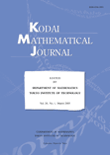
Kodai Mathematical Journal
Empowering Researchers with Rigorous Mathematical DiscourseKodai Mathematical Journal is a distinguished publication dedicated to advancing the field of mathematics, particularly in miscellaneous areas. Established in 1949, this esteemed journal has been a reputable source for researchers and practitioners who seek to contribute to the rich landscape of mathematical knowledge. Published by KINOKUNIYA CO LTD, the journal is based in the academic environment of Tokyo Institute of Technology and serves a global audience with rigorous and insightful research articles. Despite its current Q3 quartile ranking in the Scopus Mathematics category, which reflects its niche but impactful contributions, the journal is poised for growth; the convergence of traditional and novel mathematical techniques promises to enhance its relevance further. Researchers, professionals, and students are encouraged to engage with the rich content of the journal, aimed at fostering collaboration and nurturing innovation in the mathematical community. While currently not available as Open Access, Kodai Mathematical Journal remains a critical resource for those passionate about mathematics and its applications.

TRANSACTIONS OF THE AMERICAN MATHEMATICAL SOCIETY
Unveiling Insights in the Mathematical RealmTRANSACTIONS OF THE AMERICAN MATHEMATICAL SOCIETY, published by the American Mathematical Society, is a premier journal in the field of mathematics that has been contributing to the advancement of mathematical knowledge since 1900. With an ISSN of 0002-9947 and an E-ISSN of 1088-6850, this journal holds a prestigious position in the academic landscape, evidenced by its Q1 rankings in both Applied Mathematics and Miscellaneous Mathematics categories as of 2023. With a Scopus ranking of #97 in General Mathematics and a percentile standing of 75th, the journal is recognized for its rigorous peer-review process and the quality of the research it publishes. Though it does not currently offer open access options, it essentially serves as a vital resource for researchers, professionals, and students seeking critical insights and developments in mathematical theory and applications. The Transactions aim to publish high-quality research articles that foster the exchange and dissemination of ideas, supporting the growth of both theoretical and applied mathematics within the global scholarly community.

Siberian Electronic Mathematical Reports-Sibirskie Elektronnye Matematicheskie Izvestiya
Advancing Mathematical Frontiers GloballySiberian Electronic Mathematical Reports (Sibirskie Elektronnye Matematicheskie Izvestiya) is a prominent academic journal dedicated to the dissemination of cutting-edge research in the field of mathematics. Published by the esteemed Sobolev Institute of Mathematics in the Russian Federation, this journal provides a vital platform for scholars from around the globe to share their innovative findings and methodologies. With an ISSN of 1813-3304 and an impressive recognition within the academic community, the journal currently holds a Q2 classification in Mathematics (miscellaneous) and ranks #256 out of 399 in general mathematics according to Scopus, indicating its relevance and contribution to the field. While operating on an open-access model, Siberian Electronic Mathematical Reports ensures that high-quality research is readily accessible, promoting collaboration and knowledge sharing among researchers, professionals, and students. Covering a broad spectrum of mathematical topics, it aims to foster interdisciplinary connections and advance the understanding of mathematical principles in various applications. As it converges years from 2011 to 2024, this journal remains an essential resource for those looking to stay updated on significant advancements and contemporary discussions within the mathematical sciences.
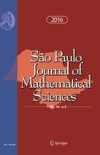
Sao Paulo Journal of Mathematical Sciences
Illuminating the complexities of mathematics for all.Welcome to the Sao Paulo Journal of Mathematical Sciences, a pivotal platform dedicated to advancing the field of mathematics, published by Springer International Publishing AG. Established in 2015 and running until 2024, this journal serves as a vital resource for researchers, professionals, and students interested in a plethora of mathematical topics, including computational theory, statistics, and general mathematics. While the journal holds a current Q4 quartile ranking in its categories, it provides an opportunity for contributors to disseminate innovative findings in an accessible manner. Although not an open-access publication, the journal is committed to ensuring that high-quality research is available to the academic community, fostering collaboration and growth within the discipline. Researchers seeking to publish in a dynamic and developing journal should consider the Sao Paulo Journal of Mathematical Sciences as an essential avenue for their work.
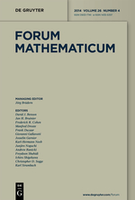
FORUM MATHEMATICUM
Where Mathematics Comes to Life: A Forum for ScholarsFORUM MATHEMATICUM, published by WALTER DE GRUYTER GMBH, is a distinguished academic journal based in Germany, known for its significant contributions to the field of mathematics. With an ISSN of 0933-7741 and an E-ISSN of 1435-5337, the journal features comprehensive studies ranging from applied mathematics to diverse mathematical disciplines. Having maintained a commendable presence since 1989, FORUM MATHEMATICUM has achieved notable classification rankings, including Q2 in Applied Mathematics and Q1 in miscellaneous Mathematics as of 2023. Additionally, it holds a Scopus rank within the top 60th percentile in General Mathematics, making it a prominent platform for researchers and professionals seeking rigorous analysis and innovative methodologies in mathematics. While the journal does not currently offer open access, its rich content is pivotal for advancing mathematical theory and applications, appealing to students and seasoned academics alike.
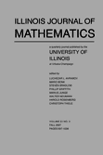
ILLINOIS JOURNAL OF MATHEMATICS
Pioneering excellence in mathematical research.Illinois Journal of Mathematics, published by Duke University Press, is a prestigious academic journal dedicated to advancing research in the field of mathematics. Established in 1957, this journal spans decades of scholarly contributions, with a focus on innovative and original research across various mathematical disciplines. As of 2023, it holds a commendable Q2 ranking in the mathematics category, reflecting its significant impact within the academic community, with an impressive Scopus rank of #275 out of 399. The Illinois Journal of Mathematics does not currently offer open access options, yet it remains a critical resource for mathematicians, researchers, and students seeking high-quality research articles and the latest advancements in the field. With its commitment to excellence, the journal aims to foster scholarly dialogue and exploration among mathematicians, making it an essential publication for anyone passionate about mathematics.

Lithuanian Mathematical Journal
Connecting Scholars Through Mathematical ExplorationLithuanian Mathematical Journal is a prominent academic publication that has been advancing the field of mathematics since its inception in 1973. Published by SPRINGER, this journal provides a platform for researchers, professionals, and students to disseminate their findings and engage with the latest developments in various branches of mathematics. With an ISSN of 0363-1672 and an E-ISSN of 1573-8825, it is accessible to a global audience, primarily serving as a hub for mathematical discourse and innovation. Despite its current categorization in Q4 within the miscellaneous mathematics category and holding a Scopus rank of #284 out of 399, the journal continuously aims to elevate its impact by contributing to significant mathematical research. The importance of this journal lies not only in its rigorous peer-review process but also in its commitment to fostering academic collaboration and knowledge exchange in a structured yet dynamic environment.

Annales de l Institut Henri Poincare D
Elevating Scholarly Research in Quantum RealmsAnnales de l Institut Henri Poincare D, published by the esteemed EUROPEAN MATHEMATICAL SOCIETY, is a notable open-access journal dedicated to advancing the fields of mathematics and physics. With an ISSN of 2308-5827 and E-ISSN 2308-5835, this journal has risen to prominence since its inception in 2014, benefiting from a significant level of accessibility since 2022. Based in Germany, it provides a rigorous platform for scholarly research in areas such as Algebra and Number Theory, Discrete Mathematics and Combinatorics, Geometry and Topology, Statistical and Nonlinear Physics, and Statistics and Probability, where it has achieved a Q1 quartile ranking in 2023. With its Scopus ranking reflecting excellent percentile standings, particularly in Algebra and Geometry, Annales de l Institut Henri Poincare D is essential reading for researchers and academics seeking to engage with cutting-edge developments and innovative methodologies in their respective fields. Researchers can find it valuable not only for its high-quality publications but also for its commitment to fostering a global knowledge exchange in mathematics and physics.
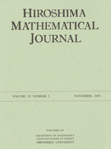
Hiroshima Mathematical Journal
Cultivating Excellence in the Mathematical CommunityThe Hiroshima Mathematical Journal, published by Hiroshima University, Graduate School of Science, serves as a prominent platform for disseminating high-quality research in the field of mathematics. Established in 1959, the journal has been an integral part of the mathematical community, focusing on areas such as Algebra, Number Theory, Analysis, and Geometry and Topology. Although currently classified in Q4 quartile rankings within its categories, the journal is committed to advancing mathematical knowledge and fostering scholarly dialogue. Its accessibility, combined with its long-standing history, makes it an essential resource for researchers, professionals, and students dedicated to exploring and enhancing the mathematical sciences. For those interested in contributing or accessing cutting-edge research, the Hiroshima Mathematical Journal continues to uphold its mission of excellence in mathematical scholarship.
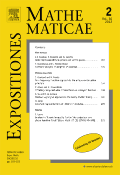
EXPOSITIONES MATHEMATICAE
Connecting Scholars Through Mathematical InsightsEXPOSITIONES MATHEMATICAE, published by Elsevier GmbH, stands as a significant journal in the realm of mathematics, catering primarily to researchers, professionals, and students. With an ISSN of 0723-0869 and an E-ISSN of 1878-0792, this journal has made its mark in the academic community, boasting a Q2 classification in the miscellaneous mathematics category for 2023, illustrating its prominence within its field. The journal addresses a diverse scope of mathematical topics, encouraging the publication of original research and innovative theories while maintaining rigorous academic standards. As it converges from 2004 to 2024, EXPOSITIONES MATHEMATICAE continues to be an essential resource for advancing mathematical knowledge and fostering scholarly communication, despite being a non-open-access publication. Its location in Munich, Germany further anchors it within a rich intellectual tradition, providing accessibility for the mathematical community worldwide.